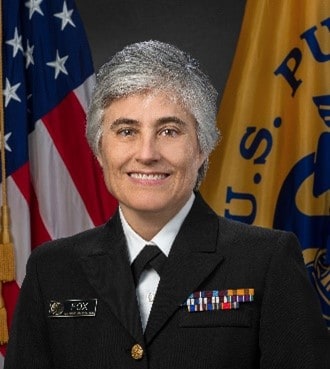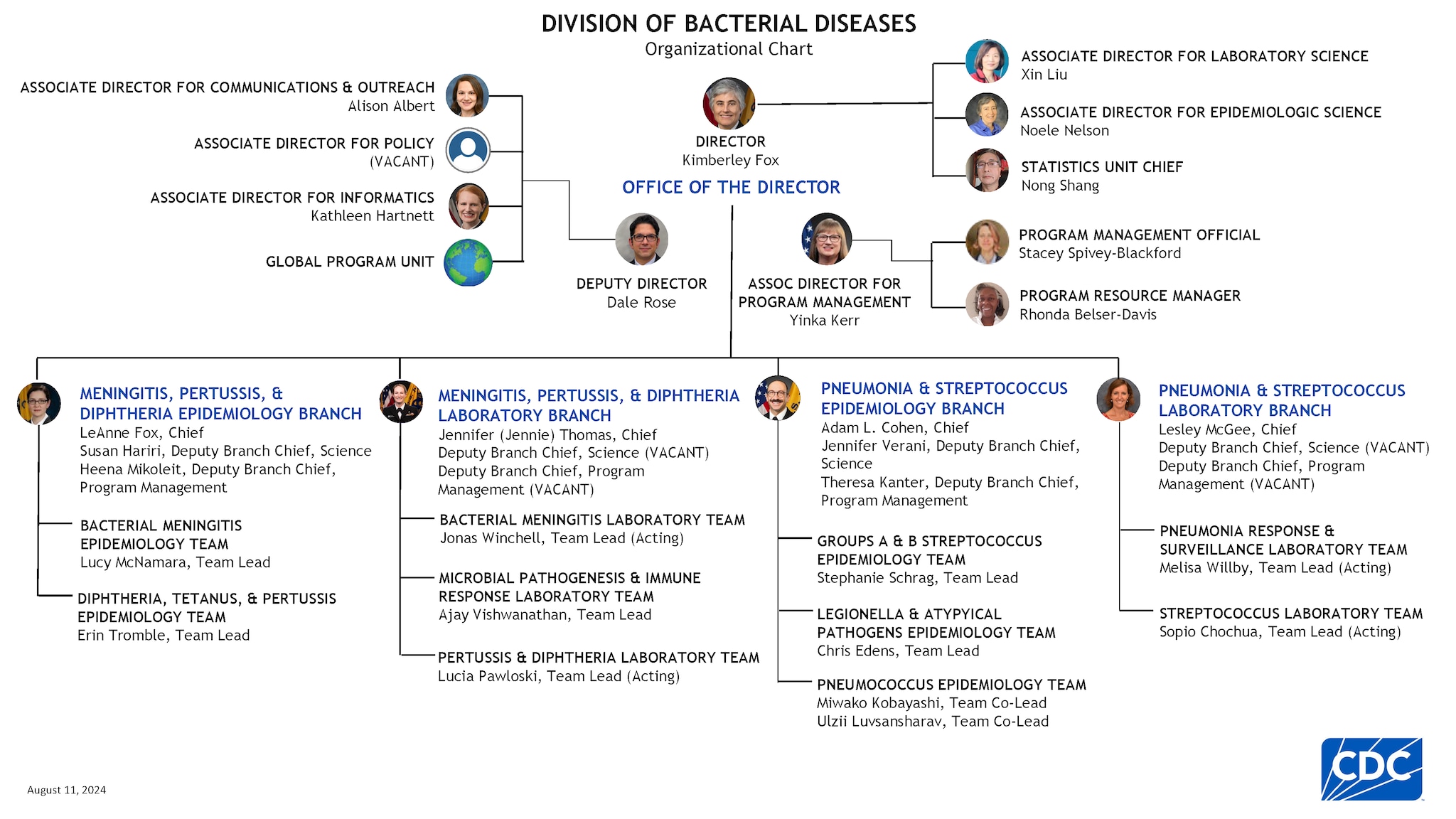Key points
- The Division of Bacterial Diseases (DBD) works to prevent and control vaccine-preventable and other respiratory bacterial diseases.
- The division works domestically and globally with a wide variety of partners.
- Learn more about DBD's mission, priorities, areas of work, and leadership.
Our mission
The mission of DBD is to prevent and control illness and death from vaccine-preventable and other respiratory bacterial diseases, in the United States and worldwide, through leadership in epidemiologic and laboratory science and policy.
DBD plays a critical role in:
- Outbreak response
- Surveillance and epidemiologic research
- Laboratory diagnosis and pathogen characterization
- Vaccine development
DBD provides scientific support for development of vaccine policy and public health guidance to control vaccine-preventable and other respiratory bacterial diseases nationally and globally.
What we do
Outbreak Response and Prevention: We respond to cases, clusters, and outbreaks in support of state, local, and international partners while promoting prevention measures.
Surveillance: We conduct national surveillance of bacterial respiratory diseases and pathogens such as:
- Bacterial meningitis
- Diphtheria
- Invasive pneumococcal disease
- Legionnaires' disease
- Pertussis
Laboratory: Our scientists support public health lab capacity building, develop advanced molecular techniques, and provide laboratory testing for diseases such as:
- Legionnaires' disease
- Meningococcal disease
- Pertussis
- Pneumococcal disease
- Streptococcal infections
Vaccines: We facilitate use of scientific evidence to inform vaccine policy and evaluate vaccine impact.
Priorities
DBD is CDC's primary unit responsible for bacterial respiratory and vaccine-preventable diseases. In addition to serving as experts in the area of bacterial respiratory and vaccine-preventable disease issues, we:
Accelerate the development, introduction, and evaluation of vaccines against bacterial respiratory diseases in the United States and globally. Diseases include:
- Pneumonia
- Meningitis
- Neonatal sepsis
- Related syndromes
Identify, assess, and implement advanced and innovative approaches to improve and expand laboratory, statistical, and epidemiological science.
Maintain and strengthen the following to ensure effective prevention and control of bacterial respiratory diseases in the United States and globally:
- Surveillance
- Early detection
- Investigation
- Response
- Policy development
Efficiently and effectively support public health programs and research through excellence in management and operations functions.
Inform the public and scientific community about bacterial respiratory diseases in the United States and globally through effective communications and policy approaches.
Our work
Where we work
DBD works in states and territories across the United States and numerous countries around the world.
Who we work with
Examples of who we collaborate closely with include:
- State and local health departments
- Ministries of health
- Other global partners, such as:
- World Health Organization
- Pan American Health Organization
- World Health Organization
- Non-governmental organizations, such as:
- Bill & Melinda Gates Foundation
- Gavi, the Vaccine Alliance
- Bill & Melinda Gates Foundation
Areas of work
Atypical pneumonias
- Chlamydia pneumoniae
- Mycoplasma pneumoniae
- Psittacosis / Chlamydia psittaci
Groups A and B Streptococcus
- Group A streptococcal (GAS) disease / group A Streptococcus
- Group B streptococcal (GBS) disease / group B Streptococcus
Legionellosis / Legionella
Surveillance system
Vaccine-preventable diseases
- Diphtheria / Corynebacterium diphtheriae
- Haemophilus influenzae disease (including Hib)
- Meningococcal disease / Neisseria meningitidis
- Pertussis / Bordetella pertussis
- Pneumococcal disease / Streptococcus pneumoniae
- Tetanus / Clostridium tetani
Leadership

Director: Kimberley Fox, MD, MPH
Dr. Kimberley Fox is the director of DBD within CDC's National Center for Immunization and Respiratory Diseases (NCIRD). Prior to her appointment, Dr. Fox served as deputy director of DBD from 2018 to 2020. As director, Dr. Fox is responsible for oversight and direction of the division's efforts to reduce illness and death from vaccine-preventable and other bacterial respiratory pathogens and meningitis, including meningococcal and pneumococcal disease, diphtheria, pertussis, and Legionella. Dr. Fox is also a captain in the U.S. Public Health Service
From 2003 to 2018, she worked on global disease surveillance, policy, and vaccination including as the Asia Regional and Thailand director of CDC's Global AIDS Program and on detail to the World Health Organization. Dr. Fox joined CDC in 1996 as an assignee to the North Carolina HIV/STD program, subsequently developing a Field Epidemiology Unit in CDC's Division of STD Prevention in Atlanta.
Dr. Fox earned a bachelor's degree in history from Princeton University and a Doctor of Medicine and Master of Public Health in Epidemiology from the University of North Carolina. She completed post-graduate training in Internal Medicine, Infectious Diseases, and Preventive Medicine at the University of North Carolina Hospitals.

